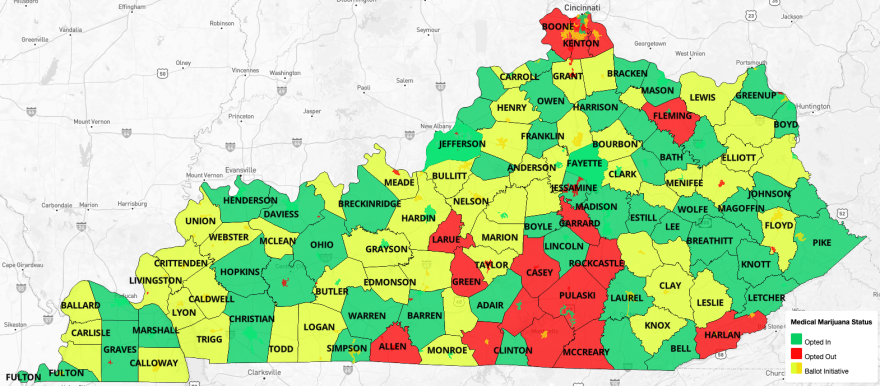Kentucky’s new medical marijuana program will go into effect on Jan. 1 next year, but where licensed businesses will be able to operate within the state is up to voters in dozens of local ballot referendums this fall.
Passed into law in 2023 and amended by another bill passed this year, the medical cannabis program is statewide for patients, yet allows cities and counties to opt out and prohibit cannabis businesses, either by ordinance or ballot referendum.
More than 100 cities and counties have opted for a ballot referendum in November that asks voters whether businesses should be allowed to operate as licensed medical marijuana growers, dispensaries, processors or compliance facilities. These local jurisdictions had until Aug. 13 to put a referendum on the ballot, which will resemble “wet/dry votes” on alcohol sales.
While local governments for the majority of Kentucky’s population have opted in to allow medical cannabis businesses, the cities and counties where voters will decide the fate of the program this fall make up nearly 30% of the state.
Medical Marijuana Status
County and city governments can also pass ordinances that either opt out or opt in to the medical marijuana program by the end of the year. As of now, cities and counties making up 12% of Kentucky’s population have opted out and have no ballot referendum.
Counties that take no action via ordinance and ballot initiative are automatically opted in to allow medical marijuana businesses, as are cities in such counties. If a county opts out via ordinance or ballot referendum, so too do its cities, unless those cities take action to opt in.
While businesses will be prohibited from operating as medical cannabis licensees in certain parts of Kentucky next year, every patient with a valid medical cannabis card due to a qualifying condition will be able to possess and use their medication, regardless of local laws.
Patchwork of varying cannabis laws likely in much of the state
Regions of Kentucky and even individual counties are likely to have a patchwork of different laws either prohibiting or allowing medical cannabis dispensaries and facilities where marijuana is grown or processed.
While Jefferson and Fayette counties will have all or most of the two most populous counties opting in to medical cannabis, laws could vary greatly within the densely populated northern Kentucky counties bordering Cincinnati.
The county governments of Kenton, Boone and Campbell counties have all passed ordinances opting out, but local cities in the region have chosen to either opt in via ordinance or put the question to voters.
Medical Marijuana Status
Kenton County’s largest city, Covington — with a population of more than 40,000 — passed an ordinance to opt in to medical cannabis businesses, while the cities of Independence, Elsmere, Ludlow and Crestview Hills — with a combined population of more than 45,000 — will have a voter referendum. If voters in each city vote yes, cannabis businesses would be allowed where roughly half of the county’s population lives.
In Campbell County, the cities of Newport and Dayton passed ordinances to opt in, while voters will decide in Alexandria, Bellevue, Southgate and Wilder.
In Boone County, there will be a ballot referendum in Florence and Union, whose residents make up roughly 29% of the county.
The region with the most counties that have already opted out completely via ordinance is south central Kentucky, where, as of now, all of Allen, LaRue, Green, Casey, McCreary, Rockcastle and Garrard will prohibit such businesses.
Most of the counties in eastern Kentucky have either opted in to allow medical cannabis businesses or are putting the question to voters.
In Floyd County, all voters will cast a ballot on the referendum, but the exception to that is in the tiny city of Wayland, with less than 400 residents. Mayor Jerry Fultz said the city passed an ordinance to opt out because they are not “ready” for medical cannabis, but said they could change their mind and opt in at a later date should residents call for that.
Another unique aspect of Floyd County is that residents of Prestonsburg, its largest city, will actually vote on two different ballot referendum questions on medical cannabis.
Prestonsburg’s city government also called for a ballot referendum, the results of which the city will be bound to, but its residents will also vote on the countywide ballot referendum to determine the fate of the rest of the county. Residents of Wayland will also vote on the countywide referendum, though the city will be opted out no matter what the outcome of this vote is.
Other cities, like Prestonsburg, where residents will vote on both the city and county medical cannabis referendum questions include:
- Mount Washington (Bullitt County)
- Georgetown (Scott County)
- Shelbyville (Shelby County)
- Bardstown (Nelson County)
- Murray (Calloway County)
- Princeton (Caldwell County)
- Manchester (Clay County)
- Marion (Crittenden County)
- Morganfield (Union County)
- Cadiz (Trigg County)
The largest city to opt out of medical cannabis via ordinance is Nicholasville in Jessamine County (population of more than 32,000), while the smallest is Rochester in Butler County (population just above 100).
The most populated county to have a countywide ballot referendum this fall is Hardin County, though its largest city, Elizabethtown, has already opted in via ordinance.
State still processing medical cannabis applications
Kentucky’s new Office of Medical Cannabis began accepting applications July 1 for businesses seeking to receive a state operating license. The window for these applications closes on Sunday and the state will begin awarding licenses via lottery in October.
Due to the lottery process for granting a limited number of licenses to applicants, not all jurisdictions opting in to Kentucky’s medical cannabis program are assured to have a business setting up shop there.
Some local jurisdictions, such as Louisville Metro Government, have already passed zoning ordinances specifying where potential cannabis businesses are allowed to operate.
Local governments that have not opted out of medical cannabis via ordinance or ballot referendum by the end of the year may choose to do so in 2025 or following years, yet that may not prohibit all of such businesses.
State law specifies that if a local government does not opt out of medical cannabis by the end of 2024, any applicant that is granted a medical cannabis business license in that jurisdiction by the end of that year would be grandfathered in, should that jurisdiction choose to prohibit such businesses in 2025 or later.
As for the counties and cities voting on whether to allow medical marijuana businesses, so far no political issue committees have filed with the Kentucky Registry of Election Finance to indicate they plan on buying ads to influence voters on the referendums, which often happens with “wet/dry” votes of local jurisdictions.
Just more than a decade ago, 40 Kentucky counties were “dry” by prohibiting alcohol sales, but there are currently only four.
State government and politics reporting is supported in part by the Corporation for Public Broadcasting.







